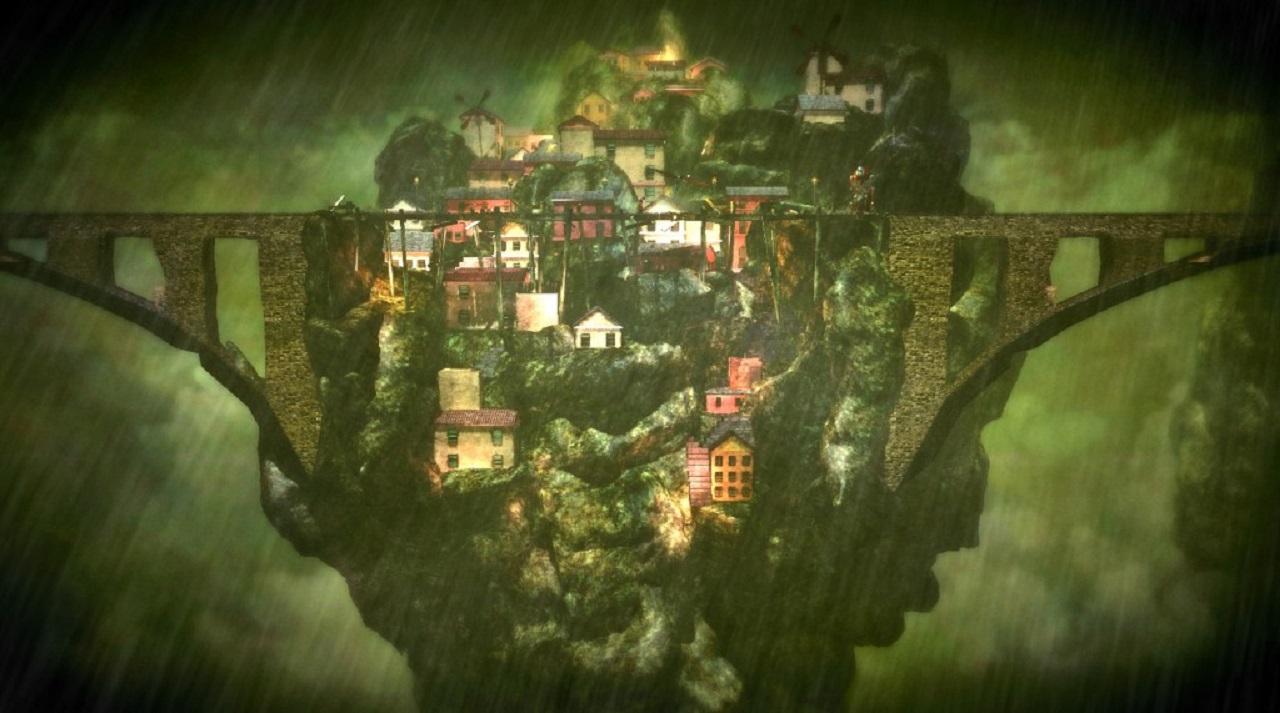For a game created by artist Eric Povan, whose career spans stints at Jim Henson’s Creature Shop and Sony Animation, as well as current employment with Disney, you’d be forgiven for thinking that 2d-platformer Spate would be something of a jolly affair.
You’d be wrong. Much like Max Payne 3, Spate is a tale about addiction. But rather than painkillers, Detective Bluth’s drug of choice is Absinthe, which – unlike its real-world counterpart, despite persistent myths to the contrary – causes numerous hallucinations to take place.
Coping with the loss of his daughter and his newfound addiction, Detective Bluth goes to investigate the mysterious death of a wealthy businessman in the X-Zone. As all noir stories go, there’s way more to the situation than it seems, and through Detective Bluth’s hard-boiled narration, we learn plenty about why things are the way they are – both in his life and in the outside world.
Detective Bluth’s storytelling, along with the always-raining X-Zone and its Steampunk sensibilities, creates a wonderfully bleak atmosphere, a perfect vehicle to show the firsthand consequences of drowning yourself in the bottom of a bottle.
Through excuses and half-truths, Detective Bluth surveys the landscape of the X-Zone, and only when he’s honest with himself — and his addiction, can he begin to confront his personal demons.
Taking a page out of 90’s platformers, Spate’s gameplay mechanics are light and floaty. Detective Bluth is easy enough to maneuver, but what adds depth is the drinking mechanic. At any time, even when climbing a floating chain, Detective Bluth can take a swig of Absinthe. Although it distorts his view, zooming out the camera and showing him surreal visuals of his lost daughter, Detective Bluth is physically empowered by his addiction.
His jumps are higher, his run is faster, and everything about him is better. From a psychological point of view – and this can be best described as a psychological platformer – this makes a great deal of sense. But as the game progresses, the Absinthe is less effective and starts to cause more frequent blackouts, mirroring the effects of real-life addiction.
Detective Bluth’s increasing reliance on alcohol has taken a terrible toll on his mind then, but to him, it’s all he has left; it’s the only thing that keeps him going. And for a game like Spate, which relies on its gameplay mechanics and environment to convey its story and atmosphere, this is a subtle but poignant choice that sets it apart from other platformers.
Spate itself clocks in at a little under two hours, although given the dark subject matter and the self-pitying nature of its protagonist, that seems about right. Any more and it might have felt as though you’ve overstayed your welcome, both in the X-Zone and in Detective Bluth’s head space.
Both the psychologically dark visuals and the moody, brooding score place the emphasis squarely on the subject matter of addiction – all while layered with rain, symbolism and surreal imagery that simulatenously fascinates and frightens. This creates a sort of symmetry between the mechanical and experiential parts of Spate, and allows the game to convey its story through both with equal precision.
The only major issue is that sometimes Bluth feels both too light and too weighty, rendering him somewhat difficult to control but not in a way that feels challenging or rewarding.
Occasional frustrations aside though, Spate is a fantastic subliminal look into the psychology of addiction – and the game’s two endings serve to reinforce that point, ultimately forcing Detective Bluth to make a very real choice that many addicts need to make once they confront the truth head-on.
If the generalities of Detective Bluth’s story seem familiar, that’s because they are. Addiction, whether to substances, thought patterns, or even forms of entertainment, is a very real thing, and Spate‘s message is what sets it apart from similar platformers.
While by no means a perfect experience, and pretty brief, Spate feels unique in a medium increasingly filled with sequels, remakes and reboots. As an original concept, it succeeds both on its own terms and as a meaningful contribution to the “are games Art?” debate, but never crosses the line into feeling pretentious. A fascinating look at one man’s struggle with grief and substance, Spate is certainly worthy of your consideration, and comes recommended.


